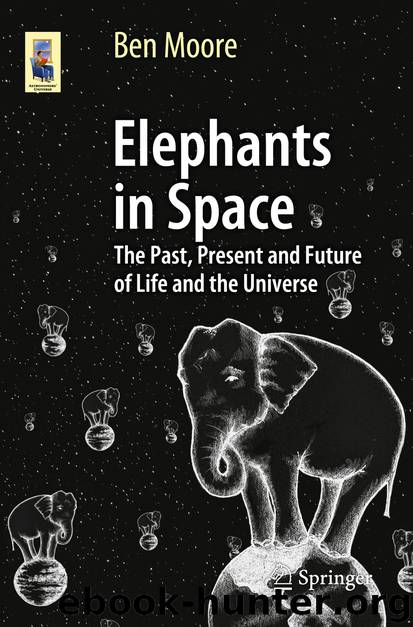Elephants in Space by Ben Moore

Author:Ben Moore
Language: eng
Format: epub
Publisher: Springer International Publishing, Cham
Ants and Elephants
How do we compare to other living creatures? If we weighed all the living things on Earth—plants, mammals, insects, bacteria, fish and so on—we would find a total of about 500 billion tonnes. Most of this exists in plants and bacteria. If we discard the water content, the total human population would weigh about 100 million tonnes. Domestic animals would add up to 700 million tonnes and crops about 2 billion tonnes—an amount similar to all of the world’s fish population. By weight, the biomass of ants and termites makes up one quarter of the total of all animals, or ten times that of humans. They occupy nearly every landmass and ecosystem on our planet from the dry hot deserts to the rainforests. They even thrive within our concrete cities.
Ants only have about 250,000 neurons compared to the 100 billion neurons of humans. Yet they are certainly one of the most successful creatures and not only by total weight and numbers. Ant colonies have social order; individual ants communicate with each other, and they can solve complex problems. They are one of a very few species outside of mammals that pass information on by direct tuition. Ants build very sophisticated underground cities that have highways, ventilation ducts, nurseries, farming areas and waste-disposal channels. Yes, that’s right, ants are the only creatures besides humans that cultivate food, showing foresight and planning. Certain species of ants take the leaves of plants deep into their cities to special chambers to grow fungus on them. These chambers are kept at just the right conditions for the fungus to grow, which eventually supplies food for the ants. Ants also farm other insects for food, another trait they have in common with humans. They “domesticate” aphids, shepherding them to feed on plants and protecting them from other predators. The ants “milk” the aphids to extract a sweet liquid which is shared among the ant colony. These skills were developed 10 million years ago whereas humans began these traits just 10,000 years ago—if aliens had visited Earth prior to this time they may have thought that ants were the most intelligent species.
The moral behaviour of ants parallels that of humans. They can be altruistic and will sacrifice themselves for the benefit of the colony. They wage organised war against other colonies to capture territory and food resources. The victorious colony will often enslave their opponents. Other species of ants will settle their differences by choosing single individuals to fight one on one; the losing colony will submit and be slaves to the victor. Just a few years ago, a single ant supercolony containing a million queen ants was found to stretch from France to Greece. All the queens were related, and an ant which moved from one side of the colony to the other would be recognised as part of the colony and taken in.
I have only touched on some of the remarkable facts about ants to illustrate the power of collective behaviour despite each individual having a tiny brain.
Download
This site does not store any files on its server. We only index and link to content provided by other sites. Please contact the content providers to delete copyright contents if any and email us, we'll remove relevant links or contents immediately.
Tools of Titans by Timothy Ferriss(8371)
Turbulence by E. J. Noyes(8041)
Secrets of Antigravity Propulsion: Tesla, UFOs, and Classified Aerospace Technology by Ph.D. Paul A. Laviolette(5369)
Astrophysics for People in a Hurry by Neil DeGrasse Tyson(5184)
Room 212 by Kate Stewart(5106)
Design of Trajectory Optimization Approach for Space Maneuver Vehicle Skip Entry Problems by Runqi Chai & Al Savvaris & Antonios Tsourdos & Senchun Chai(5066)
Pale Blue Dot by Carl Sagan(4999)
The David Icke Guide to the Global Conspiracy (and how to end it) by David Icke(4710)
A Journey Through Divination and Astronomy by Publishing Pottermore(4382)
Goodbye Paradise(3802)
Apollo 8 by Jeffrey Kluger(3707)
COSMOS by Carl Sagan(3619)
The Five People You Meet in Heaven by Mitch Albom(3562)
Losing the Nobel Prize by Brian Keating(3534)
How to Read Water: Clues and Patterns from Puddles to the Sea (Natural Navigation) by Tristan Gooley(3466)
Brief Answers to the Big Questions by Stephen Hawking(3430)
How to Read Nature by Tristan Gooley(3336)
The Order of Time by Carlo Rovelli(3188)
A Brief History of Time by Stephen Hawking(3022)
